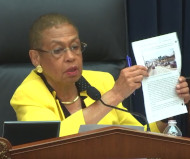9/18/2019
US House Debates Monetizing CongestionUS House hearing explores both sides of the use of tolls to convert traffic jams into a revenue source.

Groups interested in the monetization of congestion appeared last week before the US House Subcommittee on Highways and Transit for a hearing that examined both the advantages and disadvantages of imposing tolls on existing road capacity. Representative Peter DeFazio (D-Oregon), the full Transportation Committee's chairman, expressed concern about tolling given the sky-high rates being charged on the Interstate 66 toll road in Virginia.
"You can't just price people off the road," DeFazio said. "When Eleanor talked about $47 for ten miles, that's not even a Lexus lane -- that's a chauffeured limousine lane. Who can afford that?"
DeFazio also cited the "tolling fatigue" in Texas that caused the state legislature to place a moratorium on new toll roads in expressing a clear preference to raise the gasoline tax. As an excise tax levied at the distributor level, the gas tax raises funds for transit without the overhead costs of tolling.
"The bottom line is, we gotta pony up some money or we're not going to solve any problems," DeFazio said.
Subcommittee chairman Eleanor Holmes Norton, the non-voting delegate for the District of Columbia, questioned whether tolling actually solves congestion. She demonstrated the point by holding up a photo provided by Oliver Gilbert III, the Miami-Dade Transportation Planning Organization chairman and a tolling advocate. The photo showed an empty toll lane, while the general purpose lanes were jammed with traffic.
"I see a lot of people on the right," she said. "It looks like people saying, 'No thank you.'"
Tolling technology company ITS America suggested that, in San Francisco, California, driving is only for the wealthy.
"Driving in San Francisco is an expensive way to commute," ITS America representative Tilly Chang testified. "Most peak period drivers earn high incomes, and low-income commuters are generally on transit."
Chang suggested the solution is to use the funds generated by tolling and congestion taxing to spend on transit. The trucking industry, which pays the highest rate when using toll roads, testified against the imposition of tolls on existing freeway lanes. American Trucking Associations representative Darren D. Hawkins said tolling was inefficient, citing the massive cost involved in collecting even all-electronic tolls.
"A recent study found that converting all interstates into toll roads would cost more than $55 billion," Hawkins testified. "On the Ohio Turnpike, for example, 19 cents out of every dollar is spent collecting tolls. Contrast this with the 0.2 percent cost of collecting the federal fuel tax."
The US government spent $75 million collecting $37 billion in gasoline tax revenue nationwide in 2017. By comparison, a single toll road system, the Pennsylvania Turnpike, spent $212 million to collect just $1 billion in tolling revenue.
"Clearly, the waste that goes into collecting a toll is simply unacceptable when far more efficient alternatives are available," Hawkins said.


